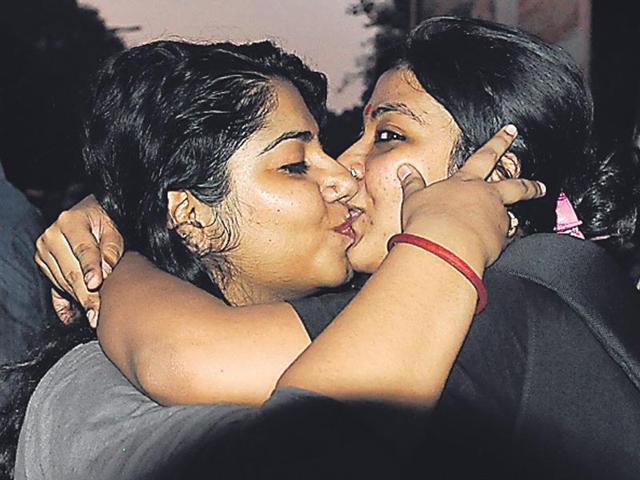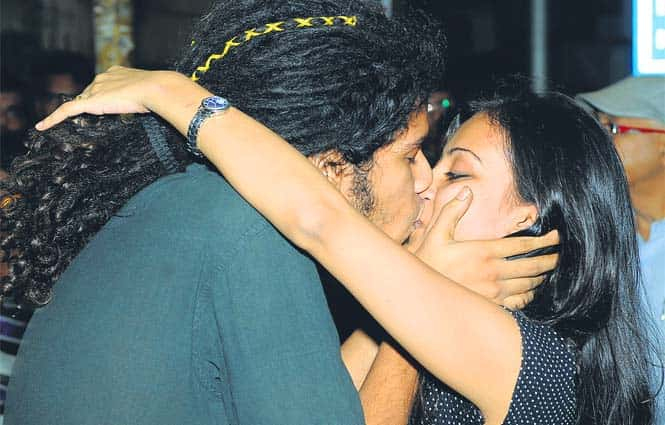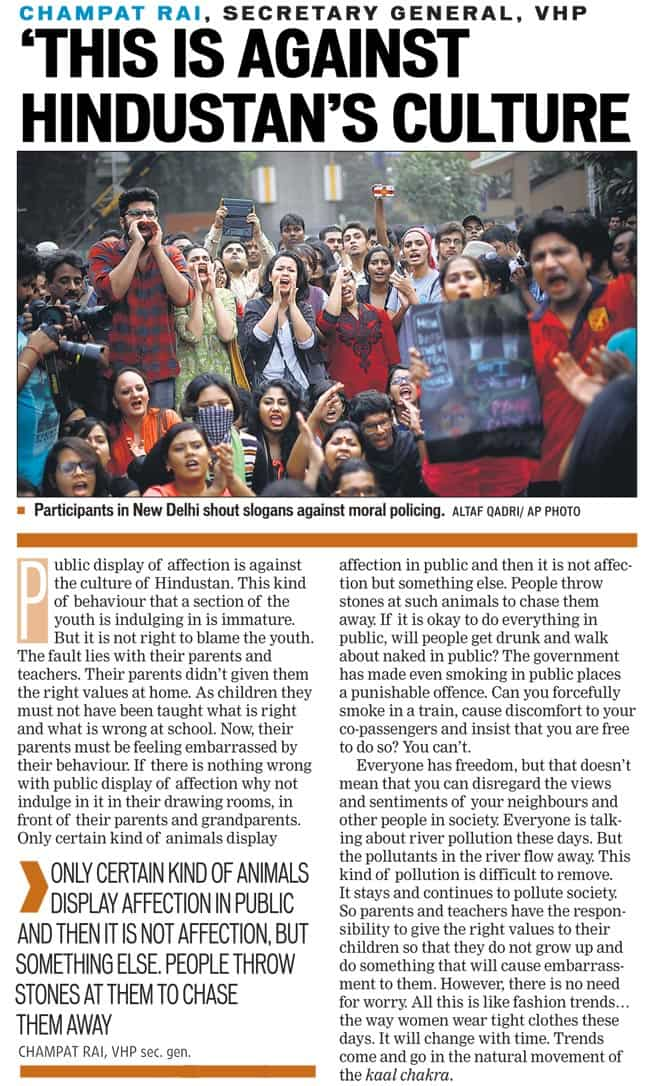Kissing up a storm
India has changed vastly in the last couple of decades, and Liberalisation ensured that it cast aside its old socialism to embark on a path to high growth. This has meant a change in lifestyles for many who now cannot imagine cities without malls and multiplexes.
In Jhumpa Lahiri’s The Namesake, the protagonist Gogol Ganguli is struck by the difference between the marriages of his parents and that of his American girlfriend. In all his life, “he has never witnessed a single moment of physical affection between his parents”.

Maxine’s parents kiss openly.
That absence of the physical display of affection is one of the many things that Gogol would have to come to terms with as he traverses the difference between the Indian culture of his family and the American way of life around him. Gogol’s parents were married in the 1960s, when most Indian couples would not even address their partners by name, so perhaps their attitudes were in keeping with the times.
But India has changed vastly in the last couple of decades, and Liberalisation ensured that it cast aside its old socialism to embark on a path to high growth. This has meant a change in lifestyles for many who now cannot imagine cities without malls and multiplexes.

This great change in the economic outlook of the Indian middle class hasn’t meant a concomitant broadening of outlook or a wholesale jettisoning of older taboos. Both, the love jihad campaign and the outrage against couples who chose to publicly kiss as a protest against the increasing moral policing of public spaces, highlights India’s enduring discomfort with public displays of affection (PDA).
“In Indian culture, PDA has always been seen as superfluous, as a sign of hypocrisy. In joint families, in the past, it would be customary for the head of the family to not show any outward signs of affection for his own children because all children in the family were expected to be equal to him. Our stand on PDA is somewhat akin to Victorian English morality where the flaunting of emotions was frowned upon,” explains psychologist and sociologist Ashis Nandy.
This need to keep genuine feeling hidden away led to some curious consequences in our cinema with the development of an entire allegorical vocabulary to suggest sexual attraction and consummation.
Nodding flowers and cooing birds were acceptable visual shorthand for intimacy between the lead couple in most Indian films of the 1960s and 70s. This prudery is puzzling considering that Seeta Devi kissed Charu Roy lustily in A Throw of Dice in 1929 and Devika Rani kissed Himanshu Rai for four long minutes in Karma (1933) much before ‘serial kisser’ Emraan Hashmi was born.
Few know that it was only with the Cinematograph Act of 1952 that sensuality gave way to conservatism in Indian cinema. Nandy believes the greater openness among certain sections is a result of a greater exposure to the West. “The current trend of showing affection is an imitation of the American way of life and more visible among the upwardly-mobile section of society,” he says adding that most would still draw the line at holding hands, hugging or an affectionate kiss.
Indeed, even most seemingly westernised Indians continue to be leery of couples kissing passionately in public — a sight that’s common in many European cities. “I am okay with people holding hands, hugging and kissing in public. But I don’t want to see people getting turned on in front of me. But the moral policing against PDA shows a dog-in-the-manger attitude,” says writer Anuja Chauhan.
Ravinder Singh, whose books are avidly read by the young, agrees. “I would like to encourage people to express love. There is so much hatred around us today. PDA can only add warmth to society,” he says. Expectedly, the Valentines-Day-opposing, jeans-clad-women-targetting orthodox groups don’t agree. “Only animals of a certain kind display affection in public and then it is not affection, but something else,” says secretary general of the Vishwa Hindu Parishad, Champat Rai.
These were the sort of views that the first ‘Kiss of Love’ protesters in Kochi were objecting to. The idea caught on and spread to university campuses in Kolkata, New Delhi and Hyderabad. “It’s not simply about PDA. There have been a series of attacks on one’s access to public spaces and one’s right to choose how one wants to live one’s life. There have been repeated mentions of love jihad and protest against inter-caste marriages. We wanted to connect all these issues in our protest. We had the support not just of the youth, but also of parents, lawyers and activists,” says 26-year-old Pankhuri Zaheer, an M.Phil scholar at New Delhi’s Jawaharlal Nehru University.
Expectedly, the protest triggered a counter-attack from conservatives and the community’s Facebook page attracted vicious comments including sexual threats and slurs. Surprisingly, the opposition was not all from senior citizens. In the physical as well as the virtual space, ‘Kiss of Love’ protesters fought a section of their own generation.
“These young people must know in their hearts that there is nothing wrong with PDA. But they are politically motivated,” says Ravinder Singh. It is easy to understand the shock of older people at seeing children or grandchildren openly express their affections for members of the opposite sex.
But a hard core of conservatism continues to exist among many young Indians too, with class, educational and attitudinal divides particularly sharp among those most comfortable in the vernacular languages and their ‘Macaulayputra’ cohort that’s also comfortable in English.
“There is definitely a clash of mind sets. The good thing is that many young people who are travelling to cities from smaller towns are learning to question set thought patterns and accept the change,” says Singh. While people are generally more liberal in urban areas, levels of acceptance of ways of dressing and behaviour vary across metropolitan spaces.
“It’s like how I tell my college-going daughters that it’s OK to wear shorts if they are going to Select City Walk mall but not if they are travelling by the metro. We have created these safe spaces in our minds,” says Chauhan. This compartmentalisation has always been a regular feature of Indian life but it would seem that the realisation that a globalised world appreciates outward cosmopolitanism more has led to some confusion among those intent on clinging to what they perceive as their core values.
This then manifests itself in the sort of viciousness directed against the Kiss of Love protestors. And then there are the legal loopholes. Section 294 of the Indian Penal Code (IPC) states that “whoever, to the annoyance of others, a) does any obscene act in any public place, or b) sings, recites or utters any obscene songs, ballad or word, in or near any public place, shall be punished with imprisonment of either description for a term which may extend to three months, or with fine, or with both.” The absence of a clear definition of obscenity means anyone could be a target.
This section is often used by both curmudgeonly killjoys who begrudge couples the privacy they seek in city gardens and policemen intent on extorting money from those same couples. All the world loves a lover, Ralph Waldo Emerson wrote, in an essay on love. What did he know? He was American.
In India, despite popular Hindi film songs proclaiming “Khullam khulla pyaar karenge hum dono”, strident moral policing looks set to make the experience of falling in love an even more fraught one.
Love is not something to be hidden. I’m very ok with PDA: Pooja Bedi
Do you know that in France couples are paid to kiss in public to boost the image of the country as a romantic place? It is tragic that, in India, displays of affection trigger such immediate outrage.
When people fight in public, or spread violence, there is no outrage. Public displays of affection are beautiful, heartwarming. One should see and learn. Love is not something to be hidden.
I am very okay with people hugging and kissing in public. Only when it gets overtly sexual, does one feel the need to draw a line. I don’t think the kind of conservatism that a section of society is displaying today is natural to us.
This is Victorian morality that descended on our very sensual culture. But we have to realise that the days of Victorian morality are over. Gone are the days of the purdah.
Women today are coming out and claiming their place in society. With that, the equation between men and women is also changing. Friendship between the sexes was taboo not very long ago.
Today, friendship between girls and boys is common not just in metros but also in smaller towns. Urban and semi-urban spaces and even smaller towns are opening up. Women are freely going out with their male colleagues for business lunches. It wouldn’t have been so easy to do that even a few years back. Girls are wearing jeans even in villages.
It is wonderful to be able to express oneself like this. Sometimes, India’s herd mentality can be good. As cities open up, you can see the trickle-down effect in smaller towns and villages.
People tend to think that if everyone is doing it, there is nothing wrong in it. As for the right-wingers, I believe they are in a minority, but they scream so loudly that one tends to think of their opinion as the majority opinion.
The extremists do not echo the majority’s views. Sometime back, political parties were trashing Valentine’s Day gift shops and cops were beating couples in parks, and there was a public backlash against them.
We do not need such moral policing, especially from the police whose job it is to uphold the law, not their personal moral standards. India is not just about such right-wing sentiments.
The youth that the right wing opposes is as Indian as they are, and their voice, beliefs and value systems are as important and valid, and should be given freedom of expression.






